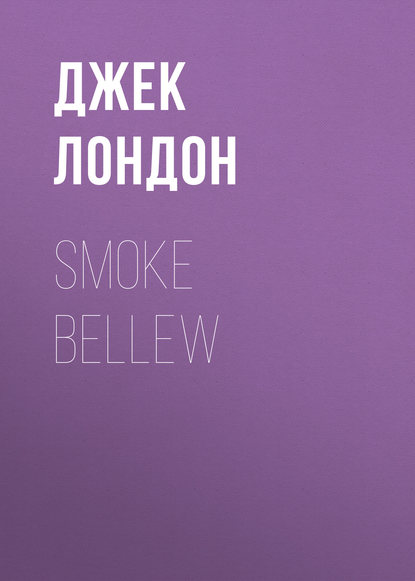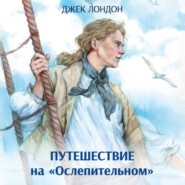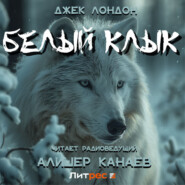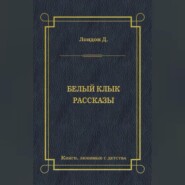По всем вопросам обращайтесь на: info@litportal.ru
(©) 2003-2024.
✖
Smoke Bellew
Настройки чтения
Размер шрифта
Высота строк
Поля
“But the system?” Moran demanded impatiently. “We know you can pick winning numbers, and we know what those numbers are; but how do you do it?”
“By observed sequences. By accident I chanced twice to notice the ball whirled when ‘9’ was opposite. Both times ‘26’ won. After that I saw it happen again. Then I looked for other sequences, and found them. ‘Double naught’ opposite fetches ‘32,’ and ‘11’ fetches ‘double naught.’ It doesn’t always happen, but it USUALLY happens. You notice, I say ‘usually.’ As I said before, I have my suspicions, but I’m not saying anything.”
Big Burke, with a sudden flash of comprehension reached over, stopped the wheel, and examined it carefully. The heads of the nine other game-owners bent over and joined in the examination. Big Burke straightened up and cast a glance at the near-by stove.
“Hell,” he said. “It wasn’t any system at all. The table stood close to the fire, and the blamed wheel’s warped. And we’ve been worked to a frazzle. No wonder he liked this table. He couldn’t have bucked for sour apples at any other table.”
Harvey Moran gave a great sigh of relief and wiped his forehead. “Well, anyway,” he said, “it’s cheap at the price just to find out that it wasn’t a system.” His face began to work, and then he broke into laughter and slapped Smoke on the shoulder. “Smoke, you had us going for a while, and we patting ourselves on the back because you were letting our tables alone! Say, I’ve got some real fizz I’ll open if you’ll all come over to the Tivoli with me.”
Later, back in the cabin, Shorty silently overhauled and hefted the various bulging gold-sacks. He finally piled them on the table, sat down on the edge of his bunk, and began taking off his moccasins.
“Seventy thousan’,” he calculated. “It weighs three hundred and fifty pounds. And all out of a warped wheel an’ a quick eye. Smoke, you eat’m raw, you eat’m alive, you work under water, you’ve given me the jim-jams; but just the same I know it’s a dream. It’s only in dreams that the good things comes true. I’m almighty unanxious to wake up. I hope I never wake up.”
“Cheer up,” Smoke answered. “You won’t. There are a lot of philosophy sharps that think men are sleep-walkers. You’re in good company.”
Shorty got up, went to the table, selected the heaviest sack, and cuddled it in his arms as if it were a baby. “I may be sleep-walkin’,” he said, “but as you say, I’m sure in mighty good company.”
V. THE MAN ON THE OTHER BANK
It was before Smoke Bellew staked the farcical town-site of Tra-Lee, made the historic corner of eggs that nearly broke Swiftwater Bill’s bank account, or won the dog-team race down the Yukon for an even million dollars, that he and Shorty parted company on the Upper Klondike. Shorty’s task was to return down the Klondike to Dawson to record some claims they had staked.
Smoke, with the dog-team, turned south. His quest was Surprise Lake and the mythical Two Cabins. His traverse was to cut the headwaters of the Indian River and cross the unknown region over the mountains to the Stewart River. Here, somewhere, rumour persisted, was Surprise Lake, surrounded by jagged mountains and glaciers, its bottom paved with raw gold. Old-timers, it was said, whose very names were forgotten in the frosts of earlier years, had dived into the icy waters of Surprise Lake and fetched lump-gold to the surface in both hands. At different times, parties of old-timers had penetrated the forbidding fastness and sampled the lake’s golden bottom. But the water was too cold. Some died in the water, being pulled up dead. Others died later of consumption. And one who had gone down never did come up. All survivors had planned to return and drain the lake, yet none had ever gone back. Disaster always smote them. One man fell into an air-hole below Forty Mile; another was killed and eaten by his dogs; a third was crushed by a falling tree. And so the tale ran. Surprise Lake was a hoodoo; its location was unremembered; and the gold still paved its undrained bottom.
Two Cabins, no less mythical, was more definitely located. “Five sleeps,” up the McQuestion River from the Stewart, stood two ancient cabins. So ancient were they that they must have been built before ever the first known gold-hunter had entered the Yukon Basin. Wandering moose-hunters, whom even Smoke had met and talked with, claimed to have found the two cabins in the old days, but to have sought vainly for the mine which those early adventurers must have worked.
“I wish you was goin’ with me,” Shorty said wistfully, at parting. “Just because you got the Indian bug ain’t no reason for to go pokin’ into trouble. They’s no gettin’ away from it, that’s loco country you’re bound for. The hoodoo’s sure on it, from the first flip to the last call, judgin’ from all you an’ me has hearn tell about it.”
“It’s all right, Shorty,” replied Smoke. “I’ll make the round trip and be back in Dawson in six weeks. The Yukon trail is packed, and the first hundred miles or so of the Stewart ought to be packed. Old-timers from Henderson have told me a number of outfits went up last fall after the freeze-up. When I strike their trail I ought to hit her up forty or fifty miles a day. I’m likely to be back inside a month, once I get across.”
“Yep, once you get acrost. But it’s the gettin’ acrost that worries me. Well, so long, Smoke. Keep your eyes open for that hoodoo, that’s all. An’ don’t be ashamed to turn back if you don’t kill any meat.”
A week later, Smoke found himself among the jumbled ranges south of Indian River. On the divide from the Klondike he had abandoned the sled and packed his wolf-dogs. The six big huskies each carried fifty pounds, and on his own back was an equal burden. Through the soft snow he led the way, packing it down under his snow-shoes, and behind, in single file, toiled the dogs.
He loved the life, the deep arctic winter, the silent wilderness, the unending snow-surface unpressed by the foot of any man. About him towered icy peaks unnamed and uncharted. No hunter’s camp-smoke, rising in the still air of the valleys, ever caught his eye. He, alone, moved through the brooding quiet of the untravelled wastes; nor was he oppressed by the solitude. He loved it all, the day’s toil, the bickering wolf-dogs, the making of the camp in the long twilight, the leaping stars overhead, and the flaming pageant of the aurora borealis.
Especially he loved his camp at the end of the day, and in it he saw a picture which he ever yearned to paint and which he knew he would never forget – a beaten place in the snow, where burned his fire; his bed, a couple of rabbit-skin robes spread on fresh-chopped spruce-boughs; his shelter, a stretched strip of canvas that caught and threw back the heat of the fire; the blackened coffee-pot and pail resting on a length of log, the moccasins propped on sticks to dry, the snow-shoes up-ended in the snow; and across the fire the wolf-dogs snuggling to it for the warmth, wistful and eager, furry and frost-rimed, with bushy tails curled protectingly over their feet; and all about, pressed backward but a space, the wall of encircling darkness.
At such times San Francisco, The Billow, and O’Hara seemed very far away, lost in a remote past, shadows of dreams that had never happened. He found it hard to believe that he had known any other life than this of the wild, and harder still was it for him to reconcile himself to the fact that he had once dabbled and dawdled in the Bohemian drift of city life. Alone, with no one to talk to, he thought much, and deeply, and simply. He was appalled by the wastage of his city years, by the cheapness, now, of the philosophies of the schools and books, of the clever cynicism of the studio and editorial room, of the cant of the business men in their clubs. They knew neither food, nor sleep, nor health; nor could they ever possibly know the sting of real appetite, the goodly ache of fatigue, nor the rush of mad strong blood that bit like wine through all one’s body as work was done.
And all the time this fine, wise, Spartan Northland had been here, and he had never known. What puzzled him was, that, with such intrinsic fitness, he had never heard the slightest calling whisper, had not himself gone forth to seek. But this, too, he solved in time.
“Look here, Yellow Face, I’ve got it clear!”
The dog addressed lifted first one forefoot and then the other with quick, appeasing movements, curled his bush of a tail about them again, and laughed across the fire.
“Herbert Spencer was nearly forty before he caught the vision of his greatest efficiency and desire. I’m none so slow. I didn’t have to wait till I was thirty to catch mine. Right here is my efficiency and desire. Almost, Yellow Face, do I wish I had been born a wolf-boy and been brother all my days to you and yours.”
For days he wandered through a chaos of canyons and divides which did not yield themselves to any rational topographical plan. It was as if they had been flung there by some cosmic joker. In vain he sought for a creek or feeder that flowed truly south toward the McQuestion and the Stewart. Then came a mountain storm that blew a blizzard across the riff-raff of high and shallow divides. Above timber-line, fireless, for two days, he struggled blindly to find lower levels. On the second day he came out upon the rim of an enormous palisade. So thickly drove the snow that he could not see the base of the wall, nor dared he attempt the descent. He rolled himself in his robes and huddled the dogs about him in the depths of a snow-drift, but did not permit himself to sleep.
In the morning, the storm spent, he crawled out to investigate. A quarter of a mile beneath him, beyond all mistake, lay a frozen, snow-covered lake. About it, on every side, rose jagged peaks. It answered the description. Blindly, he had found Surprise Lake.
“Well named,” he muttered, an hour later, as he came out upon its margin. A clump of aged spruce was the only woods. On his way to it, he stumbled upon three graves, snow-buried, but marked by hand-hewn head-posts and undecipherable writing. On the edge of the woods was a small ramshackle cabin. He pulled the latch and entered. In a corner, on what had once been a bed of spruce-boughs, still wrapped in mangy furs that had rotted to fragments, lay a skeleton. The last visitor to Surprise Lake, was Smoke’s conclusion, as he picked up a lump of gold as large as his doubled fist. Beside the lump was a pepper-can filled with nuggets of the size of walnuts, rough-surfaced, showing no signs of wash.
So true had the tale run that Smoke accepted without question that the source of the gold was the lake’s bottom. Under many feet of ice and inaccessible, there was nothing to be done, and at midday, from the rim of the palisade, he took a farewell look back and down at his find.
“It’s all right, Mr. Lake,” he said. “You just keep right on staying there. I’m coming back to drain you – if that hoodoo doesn’t catch me. I don’t know how I got here, but I’ll know by the way I go out.”
In a little valley, beside a frozen stream and under beneficent spruce trees, he built a fire four days later. Somewhere in that white anarchy he had left behind him was Surprise Lake – somewhere, he knew not where; for a hundred hours of driftage and struggle through blinding, driving snow had concealed his course from him, and he knew not in what direction lay BEHIND. It was as if he had just emerged from a nightmare. He was not sure whether four days or a week had passed. He had slept with the dogs, fought across a forgotten number of shallow divides, followed the windings of weird canyons that ended in pockets, and twice had managed to make a fire and thaw out frozen moose-meat. And here he was, well-fed and well-camped. The storm had passed, and it had turned clear and cold. The lay of the land had again become rational. The creek he was on was natural in appearance, and tended as it should toward the southwest. But Surprise Lake was as lost to him as it had been to all its seekers in the past.
Half a day’s journey down the creek brought him to the valley of a larger stream which he decided was the McQuestion. Here he shot a moose, and once again each wolf-dog carried a full fifty-pound pack of meat. As he turned down the McQuestion, he came upon a sled-trail. The late snows had drifted over, but underneath, it was well packed by travel. His conclusion was that two camps had been established on the McQuestion, and that this was the connecting trail. Evidently, Two Cabins had been found, and it was the lower camp, so he headed down the stream.
It was forty below zero when he camped that night, and he fell asleep wondering who were the men who had rediscovered the Two Cabins, and if he would fetch it next day. At the first hint of dawn he was under way, easily following the half-obliterated trail and packing the recent snow with his webbed shoes so that the dogs should not wallow.
And then it came, the unexpected, leaping out upon him on a bend of the river. It seemed to him that he heard and felt simultaneously. The crack of the rifle came from the right, and the bullet, tearing through and across the shoulders of his drill parka and woollen coat, pivoted him half around with the shock of its impact. He staggered on his twisted snow-shoes to recover balance, and heard a second crack of the rifle. This time it was a clean miss. He did not wait for more, but plunged across the snow for the sheltering trees of the bank a hundred feet away. Again and again the rifle cracked, and he was unpleasantly aware of a trickle of warm moisture down his back.
He climbed the bank, the dogs floundering behind, and dodged in among the trees and brush. Slipping out of his snow-shoes, he wallowed forward at full length and peered cautiously out. Nothing was to be seen. Whoever had shot at him was lying quiet among the trees of the opposite bank.
“If something doesn’t happen pretty soon,” he muttered at the end of half an hour, “I’ll have to sneak away and build a fire or freeze my feet. Yellow Face, what’d you do, lying in the frost with circulation getting slack and a man trying to plug you?”
He crawled back a few yards, packed down the snow, danced a jig that sent the blood back into his feet, and managed to endure another half hour. Then, from down the river, he heard the unmistakable jingle of dog-bells. Peering out, he saw a sled round the bend. Only one man was with it, straining at the gee-pole and urging the dogs along. The effect on Smoke was one of shock, for it was the first human he had seen since he parted from Shorty three weeks before. His next thought was of the potential murderer concealed on the opposite bank.
Without exposing himself, Smoke whistled warningly. The man did not hear, and came on rapidly. Again, and more sharply, Smoke whistled. The man whoa’d his dogs, stopped, and had turned and faced Smoke when the rifle cracked. The instant afterwards, Smoke fired into the wood in the direction of the sound. The man on the river had been struck by the first shot. The shock of the high velocity bullet staggered him. He stumbled awkwardly to the sled, half-falling, and pulled a rifle out from under the lashings. As he strove to raise it to his shoulder, he crumpled at the waist and sank down slowly to a sitting posture on the sled. Then, abruptly, as the gun went off aimlessly, he pitched backward and across a corner of the sled-load, so that Smoke could see only his legs and stomach.
From below came more jingling bells. The man did not move. Around the bend swung three sleds, accompanied by half a dozen men. Smoke cried warningly, but they had seen the condition of the first sled, and they dashed on to it. No shots came from the other bank, and Smoke, calling his dogs to follow, emerged into the open. There were exclamations from the men, and two of them, flinging off the mittens of their right hands, levelled their rifles at him.
“Come on, you red-handed murderer, you,” one of them, a black-bearded man, commanded. “An’ jest pitch that gun of yourn in the snow.”
Smoke hesitated, then dropped his rifle and came up to them.
“Go through him, Louis, an’ take his weapons,” the black-bearded man ordered.
Louis was a French-Canadian voyageur, Smoke decided, as were four of the others. His search revealed only Smoke’s hunting knife, which was appropriated.
“Now, what have you got to say for yourself, stranger, before I shoot you dead?” the black-bearded man demanded.
“That you’re making a mistake if you think I killed that man,” Smoke answered.
A cry came from one of the voyageurs. He had quested along the trail and found Smoke’s tracks where he had left it to take refuge on the bank. The man explained the nature of his find.
“What’d you kill Joe Kinade for?” he of the black beard asked.
“I tell you I didn’t – ” Smoke began.
“Aw, what’s the good of talkin’? We got you red-handed. Right up there’s where you left the trail when you heard him comin’. You laid among the trees an’ bushwhacked him. A short shot. You couldn’t ‘a’ missed. Pierre, go an’ get that gun he dropped.”
“You might let me tell what happened,” Smoke objected.
“You shut up,” the man snarled at him. “I reckon your gun’ll tell the story.”

















